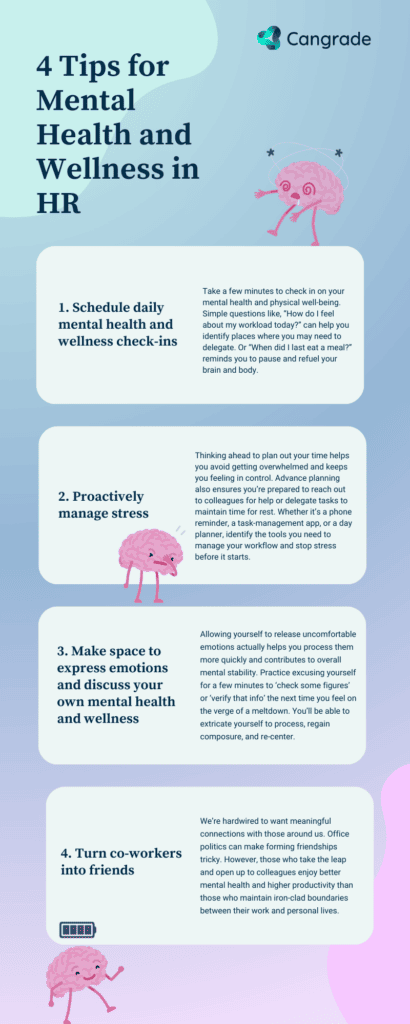4 Tips for Mental Health and Wellness in HR
Between supporting colleagues during difficult moments, promoting company culture, designing diversity and inclusion programming, and overseeing essential benefits, HR professionals spend most of their time managing others’ needs. So it’s easy to see why they might struggle to find time to care for their own. Because HR professionals spend so much time and energy on others, it’s even more important that they take steps to proactively manage their mental health and wellness. HR and mental health work best when they work together – well-resourced individuals are better able to care for others.
Here are 4 tips for HR’s mental health so you can best care for your team.
1. Schedule daily mental health and wellness check-ins
If you’re working in the Human Resources function, odds are you’re wearing a few hats. It’s easy to rush from task to task trying to get everything done. Instead, take a few minutes to check in on your mental health and physical well-being. For example, simple questions like, “How do I feel about my workload today?” can help you identify places where you may need to delegate. Or “When did I last eat a meal?” reminds you to pause and refuel your brain and body with the nutrition they need to function.
2. Proactively manage stress
Research shows that job-related stress tops the list of things keeping Americans up at night. While you can’t always escape pressure at work, you can take steps to minimize it. This will help protect HR’s mental health and wellness by building effective habits to stay on top of assignments and manage communication. Thinking ahead to plan out your time helps you avoid getting overwhelmed and keeps you feeling in control. Advance planning also ensures you’re prepared to reach out to colleagues for help or delegate tasks to maintain time for rest. Whether it’s a phone reminder, a task-management app, or a day planner, identify the tools you need to manage your workflow and stop stress before it starts.
3. Make space to express emotions and discuss your own mental health and wellness
Mental health and wellness doesn’t necessarily mean feeling on top of the world all the time. Sadness, anger, and other so-called ‘negative’ emotions are part of being human. They are normal responses to difficult or upsetting situations. Many people fear crying or letting off steam at work. But experts say that allowing yourself to release uncomfortable emotions actually helps you process them more quickly and contributes to overall mental stability. Practice excusing yourself for a few minutes to ‘check some figures’ or ‘verify that info’ the next time you feel on the verge of a meltdown. You’ll be able to extricate yourself to process, regain composure, and re-center.
4. Turn co-workers into friends
Humans are social animals. We’re hardwired to want meaningful connections with those around us. Office politics can make forming friendships tricky. However, those who take the leap and open up to colleagues enjoy better mental health and higher productivity than those who maintain iron-clad boundaries between their work and personal lives. More than lunch buddies, office friends serve as an important reminder that we don’t stop being human when we open our laptops.
You’re being pulled in so many directions. So it’s easy for Human Resources professionals to feel overstretched and less like a human. Prioritizing mental health and wellness matters. This is especially true for HR’s mental health, as HR regularly engages with emotionally and cognitively demanding tasks.
Explore additional strategies for managing your mental health and your employees here.
Download the infographic with these insights below.
